I chose the tag-line for this blog “lessons learned on and off the dance floor” because I hoped that what I write here would not only resonate with people who care about dancing, but that non-dancers would appreciate my process and find some value as well. But more importantly, the lessons you learn in one setting cross-apply to the rest of your life. Dance as a model for approaching human interaction adds complexity and nuance to in-class conversations, creating a “Zen and the Art of…” model that helps me test my theories to see which ones stand up when challenged by non-dance contexts.
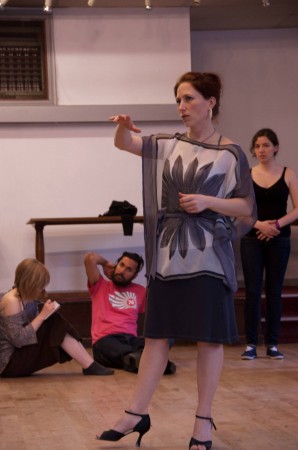
Saying something… important.
In class, my teaching partners and I often find ourselves saying things that are purely intended for the movement context, but we laugh when we hear the call-back to real life situations.
“Dance yourself, not your follow. If you’re dancing, your partner will have plenty to respond to.”
“If you release your tone, your partner can release theirs, making for a less effortful dance.”
“Just create the opportunity for your follow to turn and she’ll go on her own. Don’t force!”
“Think of lead-follow like a conversation. One person initiates a topic; the other responds.”
“Never cause a build-up of tension in your partner unless you can guarantee a good release.”
“Integrity is your ability to resist giving in to outside pressures.”
“Quit trying to ‘get it right’ – let the energy of your lead dictate your movement.”
Put these principles to work in your art, your work, and your relationships and you might find more flow and less need for force—at least, that’s always our goal.
The search for flow has been the driving force behind the decisions I’ve made in the past few years. There are plenty of books on the topic. For me, “flow” is simply the state of being in action, usually a creative action… writing without stopping to edit, dancing without an audience, playing music for myself. The editor is off; there’s little awareness of how the action is being perceived by others, and it’s repetitive or not even designed for artistic output. The ability to work automatically while my mind is free to meander creates a moving meditation. I let my thoughts move like water and follow them, not trying to push them. It’s less about “getting specific things done” and more about making space for blocks of time to be in motion.
Ultimately, whatever you’re learning in dance class should help you move with greater ease and less mental struggle. If the the lessons are sound, then you should be able to apply them to your life and experience greater flow in other areas.
The thing about dance is that it’s a skill and you need to practice it for many hours to have enough proficiency so that you can freely express without worrying about your body position, your vocabulary, where the hell your feet are: all the hallmarks of “feeling dorky.” People often ask for advice as to what kinds of other dance training they can do on their own that supports partner dancing. I make suggestions like Afro-Cuban dance, T’ai Chi, Aikido, Weight Lifting, Modern, Hip-hop… each of these solo endeavors impart a set of skills that build a better kinesthetic foundation. A mentor once observed that a student who practices any other form of movement always learns faster than one who doesn’t. Cross-training cross-applies.
But partner dance isn’t just about your body, it’s about your relationship to another person, to the music you’re interpreting, and some would say, to the community at large. To that end, taking extracurricular dance classes isn’t enough to dance well.
An Anecdote or Two:
I remember talking to a friend who was invited by a popular dancer to compete with him. He told her, “You’re going to have to really step it up for this competition. Last time I competed, a judge told me that I out-shone my follow and that’s why I didn’t do well.”
I laughed so hard. It was so obvious just by observing the way he danced what kind of person he was. My judgment might seem overly facile, but the anecdotes I heard about him over time reinforced my initial assessment: he was narcissistic, selfish and didn’t give a shit about his follow. She was there to serve him. And, it came out later, quite publicly, that his romantic relationships weren’t much different.
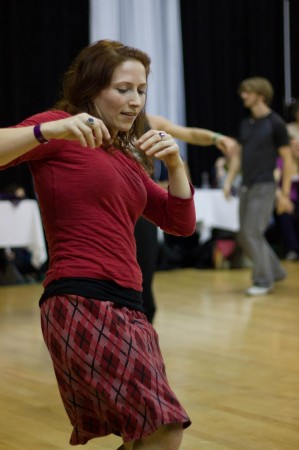
Trying to find my mojo during solo pre-lims.
So, imagine my personal discomfort when I posted online, after an event:
“What do you do when you feel you are “going through the motions” on the dance floor and it’s not just a one-night thing. How do you shake out of it? Would you say you go through phases of loving it and not loving it?”
I got a number of responses, but the one that hit where it hurt came from Barry Douglas:
“When your dance is not right, it simply means you’re not right. We sometimes use our dance to make us happy instead of using it to express whatever it is we’re feeling. The beauty in movement is that it allows us to give over ourselves and express life. Good or bad. Expecting it to do more than that can leave you empty.”
Looking back on this, he was right.
Even prior to asking for help, I’d learned not to take myself out dancing when I don’t feel I can give to my partners, just as I don’t go out on dates when I’m feeling selfish, needy, or empty.
It’s unrealistic to expect other people to fulfill you, whether it’s on the dance floor or in the context of friendship or romance. That’s hard to stomach, because often we have the unexpected experience of being fulfilled by an unplanned interaction with someone. So we want to go back for more, and we slowly begin to expect other people to fulfill our needs. When we expect the dance to make us happy, or give to us we give away our agency and ultimately find ourselves disappointed. This leads to being picky about who we dance with, when we forget that no matter what, we’re still always dancing with ourselves. Back to that adage: no matter where you go, there you are.
Being Your Own Partner
A week ago, I made face-to-face acquaintance with a friend whom I’d only had digital interaction with till then. We spent a great deal of time on our first meeting talking about relationships and what we want from our interactions with others. He was adamant that he’s ready for a relationship, but feels nobody else seems to be able to handle his brand of intensity or directness. I could tell how other-focused he was, and yet how self-analytical he was. I told him as much, that it was obvious he’d done lots of work on himself, and that I was loathe to tell him to “work on himself” more. Our conversation meandered on various points of communication and later he sent me this note:
I made myself cry this morning with this epiphany that I thought somewhat akin to your epiphany the other day of realizing that you want to work on the skill of relating with other people:
I need to be my own partner.
I put so much energy into other people and go out of my way and watch out for them and do them favors and keep them healthy and organized and on time—it’s odd that I don’t do this stuff for myself in the same way. I think I need to learn to direct that energy back toward myself more. I think this a foremost obstacle to me being more successful.
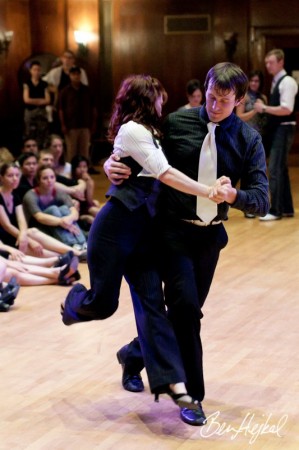
I remember being completely in flow during this competition with Chris Mayer.
I found his revelation to be gratifying and informative. He was discovering what I keep learning over and over again about how I hurt my dancing and my relationships by failing to be my own best partner first. (If you read the end of his last sentence the way I did, you might also see that he’s applying this lesson to his life-at-large, not just romance.)
If you saw my post on FOMI, then you already have an idea as to my current thoughts on why focusing on yourself is just as—if not more—important than taking more dance classes to find flow in self-expression. Thinking back to Barry’s advice, it was a clear directive to check in and ask myself what I’m really feeling and go with that.
Expressing oneself authentically and artistically is probably one of the scariest things we can do. We’re full of fear and locked down with self-protection mechanisms. What then, does it take to shed the artifice, the myriad needs and insecurities, to put ourselves out there authentically and without fear of reprisal?

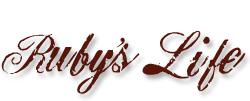
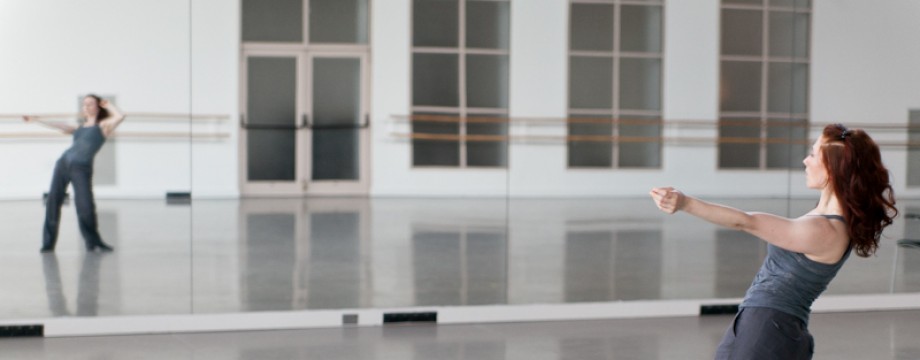
Great post Ruby!
Thought provoking and timely as usual. I’ve been discussing this issue with a few partners of mine and thinking about it myself.
Thank you for putting these thoughts so clearly in writing.
Luke
Thank you for the reminder. I sometime forget point two. Strive to be my best partner.
MT
This past weekend in London was like your post: being aware of my position, of my attitude, of the music as my surrounding in order to own my movements, my statements. Stand tall or hunch, but being conscious of what I’m communicating, finding that my voice is relevant because it’s mine, my best partner.